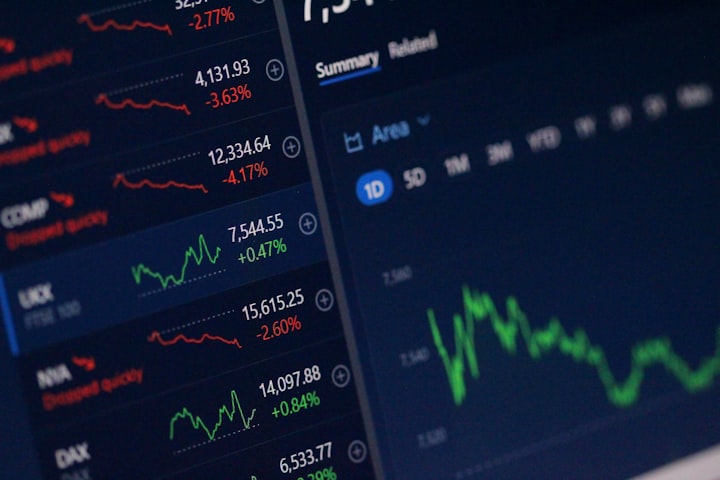Understanding Currency Trading: A Beginner's Guide To How The Market Works
Forex trading is a fast moving market with high profit potential. It is also one of the most misunderstood financial markets. Many see it as too complicated, risky and unbalanced to be worth their time. However, in reality, forex trading offers several advantages over other investments and can open up a new world of opportunities for savvy investors. In this blog post, you'll learn everything you need to know about forex trading and why it's better than a bank account.

What is Currency Trading?
Foreign exchange trading is the buying and selling of different currencies with the aim of making profits. It is also referred to as "Forex" or "FX" trading. When traders buy a currency, they assume that it will increase in value. They also believe that the other currencies they are selling will decrease in value. That is, if someone buys British pounds worth $100 and then resells them for $100, they have not made any money. On the contrary, the person who sold their pounds for $100 (and then bought them back for $100) can book a profit. Thus, currency trading is not about buying and holding currencies for the long term. It is a short-term investment with the goal of making money from changes in the value of currencies. Foreign exchange trading, although decentralized, takes place on a daily basis in financial centers around the world. In the UK, Australia, New Zealand, Singapore, Japan and Canada, trading hours are Sunday through Friday. In the U.S., trading hours are Monday through Friday. Trading also takes place in Europe, China and some other countries.
The Benefits of Currency Trading
Forex trading offers several advantages over other investments: it is liquid: you may have heard that real estate is an excellent investment. However, if you need to sell that asset immediately, you may have trouble finding a buyer. Forex, on the other hand, is a liquid market. You can sell your assets in the blink of an eye and receive cash in return. It has low entry costs but high exit costs: entering the real estate market involves high initial investment. But it's also difficult to exit the investment if you need your money back quickly. There is no correlation with other assets: stock markets are likely to go up when the economy is doing well. When the economy is in bad shape, stocks are likely to go down in value. The same is true for the commodities market and gold. However, with foreign exchange, this correlation is less likely. This means that your investment is less risky.
How Currency Trading Works
There are two basic terms that you need to understand in order to understand how forex trading works. These are "ask" and "bid." The "bid" is the price at which a seller is willing to sell his currency. The "ask" is the price at which a buyer is willing to buy the currency. The difference between these two numbers is called the "spread". The spread is the price for trading on the market. It covers the fees of brokers, market makers and other parties involved in the process. So, there are three parties involved in currency trading: the person buying or selling the currency.
Currency Pairs and the Roll-over Process
Before we get into the tips for beginners, you need to understand the basic currency pairs and the roll over process. A currency pair is the combination of two currencies that are traded against each other. The British pound is a currency that is regularly bought and sold in the market. Other currencies that are usually traded against the pound are the US dollar, the euro, the Japanese yen and the Australian dollar. Foreign exchange trading takes place around the clock. This means that there are buyers and sellers of currencies at all times. The value of each currency pair changes every second as traders buy and sell these assets. Let us take the U.S. dollar against the British pound as an example. If the U.S. dollar/British pound pair is trading at 1.28, it means that the U.S. dollar is worth 1.28 British pounds. If a British pound is worth $1.28, you can buy 1.28 pounds for $1. One way to make money in the market is to buy the US dollar against the British pound when it is trading at a lower rate. Let us say that one US dollar costs 0.9 British pounds. When you buy the US dollar, you expect its value to increase. You assume that in the near future, one US dollar will be worth 1 British pound. If your prediction comes true, you can sell the US dollar for 1 British pound.
Tips for Beginners: Knowing your risks before you invest
Forex trading is very volatile and unpredictable. It is important to understand that you can make a lot of money doing this. At the same time, you can also lose a lot of money if you do not know what you are doing. Before you start trading with real money, you need to be aware of the risks involved. You also need to know what strategies you can use to minimize those risks. Diversify your portfolio: Most investors diversify their portfolios across different types of assets. For example, they invest in real estate, stocks, bonds and gold. It is also important to diversify your portfolio when trading forex. You should not put all your eggs in one basket. Trade with a small account: It is tempting to start trading with a large amount of money. However, this strategy often leads to losses. Instead, start trading with a small amount of money. This will give you the opportunity to understand the market and make mistakes without losing a lot of money.
Frequently Asked Questions
- What is the difference between buying and selling currencies? - How do you know which currencies to trade and which to avoid? - Will I make money trading currencies? - What is the best way to practice trading before investing real money? - Are there any risks associated with currency trading? - How much money do I need to start trading? - Can anyone make money trading currencies?
What is the difference between buying and selling currencies?
This is an important question that many beginners ask. The difference between buying and selling currencies is that when you buy a currency, you expect its value to increase in the future. When you sell a currency, you expect its value to decrease in the future. So if you buy the British pound against the U.S. dollar, you expect the British pound to increase in value. When you sell the British pound against the U.S. dollar, you expect the British pound to lose value. The only exception to this rule is if you are buying or selling a currency that is pegged to another currency. In this case, you are actually buying or selling the currency that is pegged to the currency.
How do you know which currencies to trade and which ones to avoid?
After reading the previous section, you may be wondering how to find the right currencies to trade. It is important to know that you can trade any currency as long as there are buyers and sellers. However, it is important to focus on currencies that are likely to increase in value. You can use a number of tools to determine the best currencies to trade. Key economic indicators such as inflation, interest rates and gross domestic product (GDP) are important factors for currency trading. You can also use tools like Forex Selector to find out which currencies are likely to perform well. You can also look at a currency's history. If a particular currency has appreciated against other currencies in the past, it is a good option for trading.
Will I make money from trading currencies?
This is a tricky question. It all depends on the currencies you trade and the timing of your investment. You can only make money trading currencies if the value of the currency you are buying increases in the future. If you trade the US dollar against the British pound, expect the value of the US dollar to increase. If you trade the British pound against the US dollar, expect the British pound to decrease in value. Remember that you can only make money trading currencies if you buy them when they are cheap and sell them when they are expensive. It is important to understand that timing matters





Comments
There are no comments for this story
Be the first to respond and start the conversation.